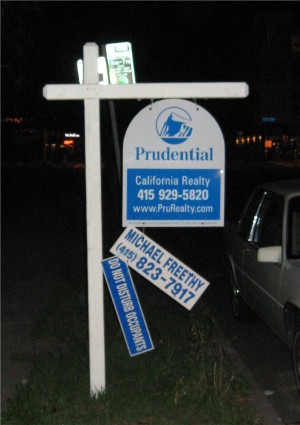
Buddy, can you spare three-quarter mil?
I am gradually coming to terms with the fact that our house may never sell. This is not the worry that most people saying that sentence have – we of course don’t own our house, but just live here. Still, it does seem at least somewhat disconcerting to be in this kind of flux.
Berkeley’s renter-protection laws are perhaps the best (strongest) in the nation. We have strict rent control that only accelerates with cost of living (so I guess we’re in for a 25% hike this year). We are mandated to receive an annual interest payment on our deposit. We cannot be evicted for much of anything, certainly not for the sale of the house where we reside.
(I say “house” by the way, because the building is a house. But there are four one-bedroom apartments herein. Lest you get the idea that we somehow occupy a whole house.)
I don’t even remember exactly when the house went on the market, but it was sometime in late spring or early summer. It was before the Winnebago showed up and thus well before it disappeared. It was long enough ago to feel like a lifetime, or at least like life was comprised of different time. Like a house priced so cheaply in such a neighborhood might sell quickly and easily and there would still be markets for such things.
There are liabilities, to be sure. While two of the apartments have been vacant since a month or so after our arrival here (March ’06), one has been occupied since the mid-1970’s. The rent controlled rates on that kind of longevity are not exactly commensurate with the current market rates. And then we’re in decently below market as well, since the same factors keeping the other two apartments vacant almost kept us from renting the place. Let’s not spend a lot of time on this, but suffice it to say that our landlord crew (it’s a whole family and its patriarch’s passage is the catalyst for the sale) is “eccentric” and “interesting”.
All this crew wants is to be rid of this house. One can’t divide a house amongst bickering parties (or one could, but that’s generally best left to reality television). One can’t eat a house (with dental work intact). One can’t turn a house into cool, liquid cash, thus applying it to whatever one’s personal vices (or virtues) or taste.
All over America, people are facing this issue. And not just people who would be eligible to play Family Feud against themselves. People are wrestling with the permanence and stability of owning a house when all they want is a little flexibility and freedom. People are dealing with the finality of equity in a world where there are more diverse financial concepts than leverage. People are crying foul in every direction, talking about how they only did what they were told, what they assumed, what every knucklehead was doing because it was free money.
It’s unclear to me whether the sign out front (pictured up top) will be fixed or not. And while it may seem obvious what I’m talking about fixing, it’s noteworthy to mention that the sign lacks any reference to the word sale. It is, in the best postmodern spirit, a “for sale” sign without the words “for” or “sale”. I’m still struggling with the implications here, but they seem multitudinous. We have come to a point in society where such signs are so ubiquitous and self-evident that they need no label or declaration. They are transcendent of their own intentions. Or, perhaps contrarily, maybe there was never any hope of sale in the first place. It’s just a marking of territory, a notice of whose responsibility it is to fix the sign. Goodness knows the landlord crew forsook their already paltry commitment to fixing things as soon as the sign went up.
It may be a little early to predict the universal presence of these signs at every domicile or piece of property in North America. For one thing, the budget for upkeep would need some work. But what happens when we get to a point where 50% of the population is unhappy with where they live? 60%? 75%? Americans take freedom of movement as their birthright and interest in moving as their unique proud tradition. When this is compromised, what will make people feel American? Certainly not the lack of credit cards and shopping malls.
This occupant is starting to feel a little disturbed.


